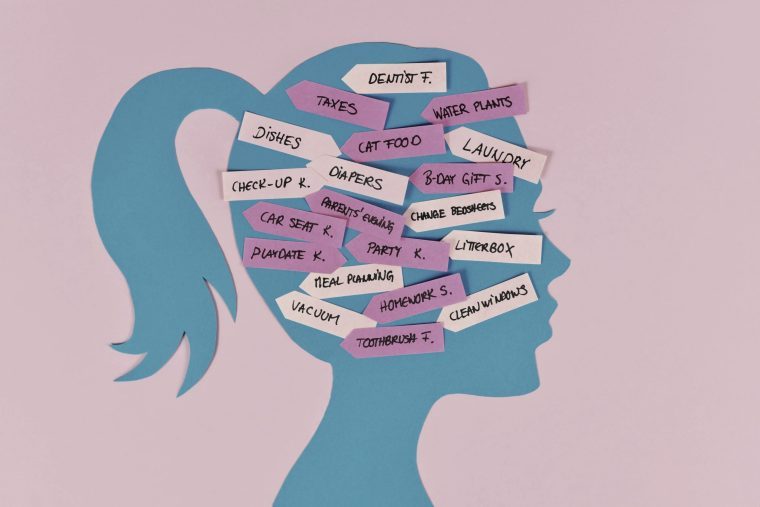All too often, women carry the mental load of what happens within their lives, relationships, and families. The mental load is the invisible work of knowing what needs to happen, when, and for whom, and ensuring that these occur.
According to Daminger (2019), the mental load has four key types of work:
- Anticipating upcoming needs
- Identifying how to meet the upcoming needs
- Making decisions, and
- Monitoring progress
For example, if you know that you have a child’s birthday coming up (Anticipating), you then work out what needs to be done (for example, buying gifts, gift-wrapping, buying a card, making a cake, throwing a birthday party, and so on; this is Identifying), and then you Make the Decisions (for example, deciding on which gift to buy this year; what type of cake to make or buy; where to have the party; and more), and then you keep track of what has happened and what still needs to happen (Has everything been bought? Wrapped? Booked? Gift bags made? Cake ordered or baked + iced? This is Monitoring Progress).
I don’t know about you, but I feel tired just writing this example. (I imagine you feel tired reading it). And I suppose that’s the point: It’s real and active work, even if it’s invisible, mental, and emotional work.
It can keep women awake at night.
It takes up your headspace.
It can feel overwhelming.
And, the key issue is that the mental load is gendered: It’s women who do the bulk of this work.
And while women typically do more work across these four tasks (Anticipating, Identifying, Making Decisions, and Monitoring Progress), men are most likely to participate in Decision-making, which Daminger argued is the task with the most power and influence. But also, if you’re carrying the mental load, Decision-making is probably where you would consult your partner, for example, on what gift to buy your child.
I remember an analogy from years ago:
Managers and project coordinators don’t do the labour as well as the management/coordination tasks- because this is a full time job in itself. Leaders are too busy coordinating tasks and people to ensure they are completed on time- they don’t have time to do the labour as well.
If you’re doing the mental load (management/project coordination) and all the labour tasks too (e.g., caregiving and household chores)- and potentially work outside the home too- this load is too much for anyone.
If you’re overwhelmed: it’s not you- it’s all the things.
This naturally leads us to: If you’re carrying the mental load, what can you do about it?
And I think there are really two different questions hiding behind that one question:
- How can you manage the mental load so you feel less like you’re drowning?, and
- If you have a partner: How can you get them to carry more of the mental load?
If we focus more on what you can do, then I recommend carrying less of it in your head- this is when the overwhelm kicks in, and the fear that you’ll forget something, which can keep you stressed and awake at night. This is where relying on the following can be helpful:
-
- Calendars and scheduling. This helps you Anticipate what is coming up, and start taking action as needed.
- To-do lists. These help with both Identifying and Monitoring Progress. And, you get a sense of achievement and progress when you tick things off- rather than simply focusing on ‘What’s next?’, or what you haven’t done yet.
- Having periodic reminders and alarms scheduled for certain dates ensures you are on top of monitoring progress rather than having to carry out this work internally.
And if you want to get your partner more involved- the easiest way is to share the above with him.
-
- Use a joint calendar- so there’s no excuse for ‘not knowing’ something or not anticipating it. You may rely on a hard copy calendar at home, or an electronic one that is shared between the two of you. Or, sync your personal electronic calendars together to overcome this.
- To-do lists can be shared. You can write a to-do list and give this to your man. You can use an app that shares joint lists between the two of you – and many different apps are available for this. (There are ones that even allow to send notifications when a new list item has been added.) If To- Do lists, grocery lists, and any other lists (for example, lists of what needs to happen for a kids party and when) are shared, then this means that you are not the only one who may be contributing to it (i.e., Identifying) or Monitoring Progress of the tasks.
- Setting reminders and alarms. You could ask your partner to set alarms for himself, but if he takes responsibility for this, you might feel the need to keep monitoring to ensure that they are monitoring progress. (It’s a trap!). Shared calendars and notifications could probably overcome this difficulty.
- You can also try completing delegating some of the daily tasks, freeing you up more for project coordination. This could involve chores, caregiving, or other tasks. You’ll want to delegate something that you can cope with if there are hiccups, tasks get forgotten on the odd time, or it is done imperfectly (at least initially). As an example, children’s activities or sports could be a good option for this, because if they are done imperfectly, occasionally forgotten, or there are hiccups- the cost is low to the household.

